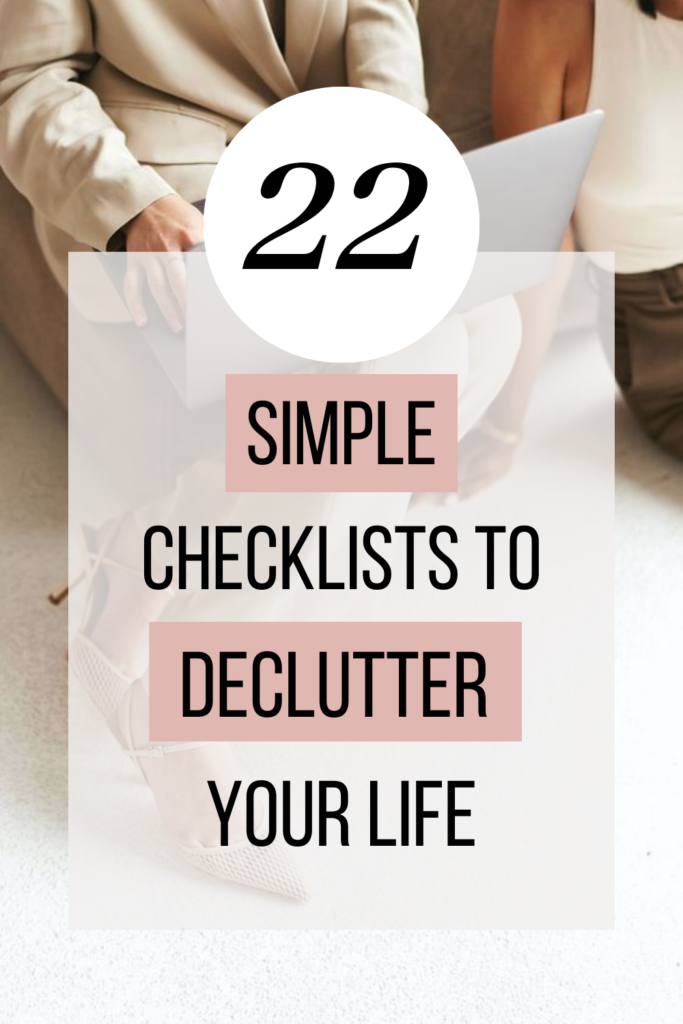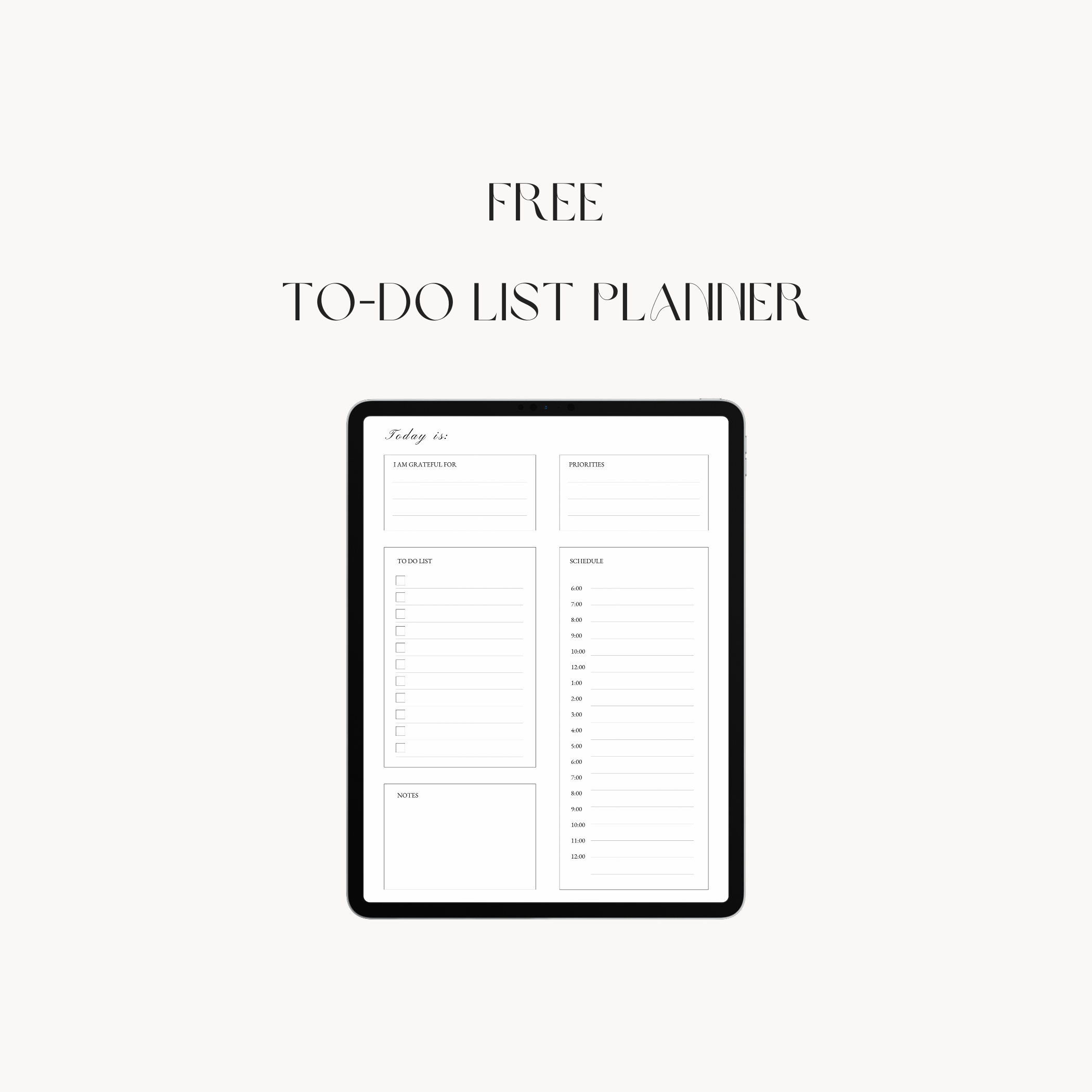Hey there! Some of the links on this blog are affiliate links. That means if you click on them and make a purchase, I might earn a tiny commission – but don't worry, it won't cost you an extra cent. It's like giving a high-five to support the content. Rest assured, I only recommend stuff I genuinely love and think you'll enjoy too!
Organizing and decluttering your life can feel like a monumental task, but with the right checklists, it can become a manageable and even enjoyable process. From daily to-do lists to special occasion checklists, these handy tools can help you stay on top of your responsibilities and enjoy a more organized life. Here are 22 simple checklists to help you get started.

Benefits of Making Checklists
Making checklists is a powerful tool for organizing and decluttering your life. Checklists help break down large tasks into manageable steps, making it easier to stay focused and on track. They reduce the mental burden of remembering every single thing you need to do, which in turn decreases stress and anxiety. By visually organizing tasks, checklists enhance time management and productivity, allowing you to allocate your time more effectively. They also provide a sense of accomplishment as you check off completed tasks, boosting motivation and morale. Moreover, checklists promote consistency in daily routines and ensure that nothing important is overlooked, leading to a more organized and efficient life.
1. Daily To-Do List
Creating a daily to-do list is a great way to start your day with a clear plan of action. List your important tasks and tackle them one by one.
Example: Write down tasks like “send work emails,” “buy groceries,” and “exercise for 30 minutes.” Tick them off as you complete each one.
Benefits: Helps with time management, reduces stress, and ensures you don’t forget important things.
2. Weekly To-Do List
A weekly to-do list allows you to plan out your tasks for the entire week. This is particularly useful for busy parents and professionals juggling multiple responsibilities.
Example: On Sunday, list all the tasks you need to accomplish for the week, such as “prepare meals,” “attend meetings,” and “clean the house.”
Benefits: Provides a broader view of your week, helps prioritize tasks, and promotes better time management.
3. Monthly To-Do List
A monthly to-do list can help you keep track of long-term goals and recurring tasks.
Example: At the beginning of the month, note down tasks like “pay bills,” “schedule doctor appointments,” and “review monthly goals.”
Benefits: Ensures you stay on top of important dates and deadlines, and helps with planning larger projects.
4. Meal Planning and Prep Checklist
Plan your meals for the week to save time and ensure a healthy lifestyle. Include a grocery list and meal prep steps.
Example: Write out a weekly menu, list ingredients needed, and set aside time for meal prep on Sundays.
Benefits: Saves time and money, promotes healthy eating, and reduces stress around mealtimes.
5. Grocery List
Keep a running list of things you need from the grocery store. This can be updated throughout the week and used when you go shopping.
Example: Create categories like “produce,” “dairy,” and “snacks” to organize your list. Add items as you run out of them.
Benefits: Prevents impulse buys, saves time, and ensures you have all the necessary ingredients for your meals.
6. Packing List
Whether you’re going on vacation or a business trip, a packing list ensures you don’t forget any essentials.
Example: List clothing, toiletries, electronics, and documents. Include specific items like “passport,” “charger,” and “swimsuit.”
Benefits: Reduces the chance of forgetting important items and makes packing more efficient.
7. Gratitude List
Maintain a gratitude list to remind yourself of the good things in your life.
Example: Each day, write down three things you are grateful for, such as “a supportive family,” “good health,” and “a beautiful sunset.”
Benefits: Improves mental health, fosters a positive mindset and reduces stress.
8. Morning Routine Checklist
Create a morning routine checklist to start your day off right. Include tasks like exercise, breakfast, and planning your day.
Example: List tasks such as “meditate for 10 minutes,” “have a healthy breakfast,” and “review daily to-do list.”
Benefits: Promotes a productive start to the day, helps establish good habits, and reduces morning chaos.
9. Self-Care Checklist
A self-care checklist ensures you’re taking care of your mental and physical health. Include activities like meditation, exercise, and hobbies.
Example: Include tasks like “read a book,” “take a bubble bath,” and “go for a walk.”
Benefits: Promotes mental health, reduces stress and enhances overall well-being.
10. Digital Declutter Checklist
Organize your digital spaces by regularly cleaning out your email inbox, desktop, and social media accounts.
Example: Set a weekly reminder to delete unnecessary emails, organize files into folders, and unfollow accounts that don’t bring you joy.
Benefits: Reduces digital clutter, improves productivity, and enhances focus.
11. Task Manager Checklist
Use a task manager checklist to keep track of ongoing projects and deadlines, both personal and professional.
Example: Create categories for work, home, and personal projects. Update progress regularly.
Benefits: Enhances productivity, keeps you organized, and ensures no task is forgotten.
12. Special Occasion Checklist
For events like birthdays or holidays, a special occasion checklist helps you plan and execute all the necessary steps.
Example: Include tasks like “buy gifts,” “send invitations,” and “plan menu.”
Benefits: Reduces last-minute stress, ensures no detail is overlooked, and makes events more enjoyable.
13. Emergency Contact List
Keep a list of emergency contacts, including family members, doctors, and important services.
Example: List names, phone numbers, and addresses for quick reference.
Benefits: Provides peace of mind, ensures quick access to important numbers and is essential in emergencies.
14. Habit Tracker
Track new habits you want to establish or bad habits you want to break.
Example: Use a calendar or app to mark each day you complete a new habit like “drink eight glasses of water” or “avoid social media before bed.”
Benefits: Encourages consistency, helps monitor progress and promotes positive change.
15. Important Documents Checklist
Ensure all important documents, like advance directives and insurance papers, are organized and easily accessible.
Example: Create a checklist of documents such as “birth certificate,” “marriage license,” and “will.” Ensure they are stored in a safe place.
Benefits: Provides peace of mind, ensures you can find documents quickly, and helps in emergency situations.
16. Gift Shopping List
Keep a running list of gift ideas for special occasions throughout the year.
Example: Note down gift ideas as they come to you, including specific items and potential stores to buy them from.
Benefits: Reduces holiday stress, ensures thoughtful gifts, and spreads out the cost over time.
17. Monthly Goals Checklist
Set and track your monthly goals for personal and professional growth.
Example: List goals like “read two books,” “complete a work project,” and “exercise 20 times.”
Benefits: Keeps you focused, promotes long-term success, and helps measure progress.
18. Bucket List
Create a bucket list of things you want to do in your lifetime. Include new experiences and long-term goals.
Example: Write down dreams like “visit Japan,” “learn to play guitar,” and “run a marathon.”
Benefits: Provides motivation, helps plan exciting activities and gives a sense of purpose.
19. Daily Routine Checklist
Outline your daily routines, including work, exercise, and relaxation time.
Example: Schedule tasks like “morning yoga,” “work from 9-5,” and “evening walk.”
Benefits: Promotes consistency, improves time management, and ensures a balanced life.
20. Cleaning Checklist
Keep track of cleaning tasks on a daily, weekly, and monthly basis to maintain a tidy home.
Example: Daily tasks might include “dishes,” weekly tasks could be “vacuuming,” and monthly tasks might include “deep cleaning the fridge.”
Benefits: Reduces cleaning overwhelm, ensures a clean living space and promotes a healthy environment.
21. Travel Checklist
For frequent travelers, a travel checklist can ensure you’re always prepared, whether for business or leisure.
Example: Include items like “book flights,” “pack suitcase,” and “arrange pet care.”
Benefits: Saves time, reduces stress, and ensures you have everything you need for your trip.
22. Brain Dump List
Whenever you have lots of ideas or feel overwhelmed, use a brain dump list to get everything out of your head and onto paper.
Example: Write down every thought, task, and idea that comes to mind without worrying about organization.
Benefits: Clears mental clutter, improves focus and helps organize thoughts.
Digital Tools for Your Checklists
1. Google Sheets: Create and share lists easily.
2. Notes App: For quick and accessible lists on the go.
3. Task Manager Apps: Tools like Todoist or Asana for more detailed task management.
4. Bulletin Board: A physical space to pin important lists and reminders.
Tips for Effective Use of Checklists
1. Prioritize: Identify the most important tasks first.
2. Be Specific: Make your tasks clear and actionable.
3. Review Regularly: Check and update your lists daily or weekly.
4. Stay Flexible: Adjust your lists as needed to accommodate new tasks or priorities.
5. Use Visuals: Color-code or use symbols to make your lists more engaging.
Checklists are valuable tools for organizing and decluttering your life. They help manage time, reduce stress, and ensure that important tasks are completed efficiently. By incorporating these 22 simple checklists into your daily routine, you can take the first step towards a more organized and productive life. Whether you’re managing a busy family, balancing professional responsibilities, or simply trying to keep your personal space tidy, these checklists will guide you in the right direction. Start today, and enjoy the peace of mind that comes with being organized!



